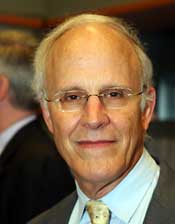David J. Gross, recipient of this year’s Nobel Prize in Physics, will give the Physics Department’s Ta-You Wu Lecture in Physics at 4:15 p.m. Nov. 3.
Gross’s lecture is entitled “Asymptotic Freedom and the Emergence of QCD (Or How I Won the Nobel Prize).” He is the Frederick W. Gluck Professor of Theoretical Physics and director of the Kavli Institute for Theoretical Physics at the University of California, Santa Barbara.

(Photo by Rod Rolle)
Gross has been a central figure in the theoretical developments surrounding the emergence of Quantum Chromodynamics (QCD). The discovery, along with Frank Wilczek, of asymptotic freedom—the primary feature of non-Abelian gauge theories—was crucial to the formulation of QCD and its emergence as the accepted theory of the strong (nuclear) force.
Asymptotic freedom is a phenomenon in which the nuclear force weakens at short distances, which explains why experiments at very high energy can be understood as if nuclear particles are made of non-interacting quarks. The flip side of asymptotic freedom is that the force between quarks grows stronger as one tries to separate them. This is the reason the nucleus of an atom never can be broken into its quark constituents.
Gross and Wilczek shared the Nobel with H. David Politzer (’69 U-M Physics).
The lecture is at 1324 East Hall Auditorium. A reception prior to lecture is at 3:45 p.m. in the East Hall first floor north atrium (behind the lecture auditorium near Church Street).
The annual Ta-You Wu lecture, one of the most prestigious lecture events in physics, was endowed in 1991 through gifts from the U-M Alumni Association in Taiwan. It serves as a permanent tribute to Ta-You Wu, Michigan physics alumnus and honorary doctor of science degree recipient (1991), and one of the central figures of the 20th century Chinese and Taiwanese physics communities.
The Physics Department is sponsoring the lecture. For more information, call (734) 764-4437 or visit http://www.physics.lsa.umich.edu/nea/special/tyw.asp.

